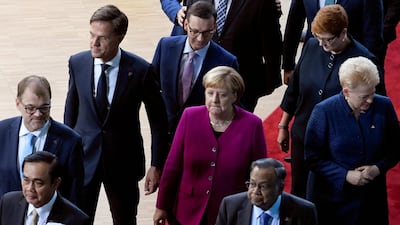Over her 13 years as chancellor, Angela Merkel has many impressive accolades to her name. She will surely go down in history as a great chancellor: the first woman and former East German resident in office, the one who pulled the plug on nuclear energy and the force that hauled German Christian democracy into the 21st century, which led to an array of landmark reforms that have changed the republic for the better. In the eyes of many Germans, her openness and humanity during the refugee crisis of 2015 constituted a glimpse of what an enlightened modern Germany could look like.
But this unhappy term in office, her fourth and last as she says, will not be remembered fondly. The weak coalition with the Social Democrats came about begrudgingly after both suffered the worst electoral results of their post-war histories. As little hope as Germans held for it, the union of necessity has let down even its greatest sceptics.
It lacked purpose and was beset from day one with an opprobrious, deluded interior minister in the form of Horst Seehofer of the Christian Social Union (CSU), the Bavarian party allied to Merkel’s Christian Democratic Union (CDU) in Germany's beleaguered coalition government. Mr Seehofer’s conviction that moving to the right was the only way to fight the far right was wrong from the beginning – and Ms Merkel knew it.
It is wholly to her credit the way she fought off the worst of Mr Seehofer's crude anti-immigration stance, although she also went a long way in placating the far right with lesser measures to stem immigration and refugee flow. But no matter the level of compromise she was willing to make, Mr Seehofer wanted more and it ended in the October 14 vote in Bavaria the way it was always going to: in a dramatic debacle, with the CSU seeing its worst election performance in more than six decades. It remains a mystery why Mr Seehofer has not resigned in light of the disaster. It is only to be hoped that he might still.
Yet he is not solely to blame and his exit from the government would by no means rectify the coalition’s core dilemma, namely that it possesses no vision for Germany, the EU, or politics in general beyond its borders.
Germany and by extension, Europe, needs a confident, visionary leader today more than ever. Donald Trump's withdrawal of the US from the greater North Atlantic alliance has left Europe on its own. Brexit and the rise of the far right across the continent has flung the EU into confusion. Emmanuel Macron's appointment in France last year suggested he might have the right mettle. And indeed, Mr Macron had big ideas for EU reform – but he needed Germany to help France push them through. It should have been a lifeline for Ms Merkel but she was not strong enough to grab it. Ms Merkel, the legendary crisis manager, simply had nothing more to give.
One obvious way for Germany to pull its weight is on climate protection, surely the most critical issue of our century and the one by which future generations will judge us. But despite a brief moment when the professional physicist was dubbed the “climate chancellor”, she did not live up to the moniker. Today Germany is actually a laggard on climate issues, holding back a more ambitious EU whose measures are laudable – but still too timid to hold in check a temperature rise of 1.5C, which a recent Intergovernmental Panel on Climate Change report underscored would have a catastrophic impact on our world.
Most Germans agree that Ms Merkel's day is done but the pundits prop her up by claiming there is no one to fill her shoes. There they are wrong.
It is virtually certain that the next chancellor will be a Christian Democrat as it is the only party that reaps more than 25 per cent of the vote. And its ranks are not lacking aspirational talent, figures who have as nearly as much experience and nous as Ms Merkel did when she came to office in 2005.
There are a bevy of potential chancellors in the pack, including the CDU's liberal-minded Merkel ally Annegret Kramp-Karrenbauer. Another is North Rhine-Westphalia's governor Armin Laschet, who, like Ms Kramp-Karrenbauer, is a progressive within the CDU but not quite as leftist as Ms Merkel. Among the more hardcore conservatives, the current health minister Jens Spahn is a favourite. Thanks to Ms Merkel, the CDU will never again be as archly conservative as it was in the past.
The key for whoever takes over will be the ability to form a lasting, constructive coalition with the Greens. The little environmental party is enjoying a surge, having garnered nearly 18 per cent in Bavaria at the ballot box and polling more than that nationally. The Greens are in office across the country and have shown they are interested in building bridges, not pulling them down. The core of the next government will be a black-green alliance (the Christian Democrats being black), although perhaps with another smaller party to boot if the electoral maths doesn’t add up.
A new, younger, rejuvenated CDU together with the self-confident Greens under their very popular leader, Robert Habeck, could spearhead a fresh government with progressive planks on EU reform, immigration and above all, energy and climate politics.
That is a challenge that Ms Merkel is no longer up to. The longer she hesitates, the more critically history will judge her.
Paul Hockenos is the author of Berlin Calling: A Story of Anarchy, Music, the Wall and the Birth of the New Berlin

